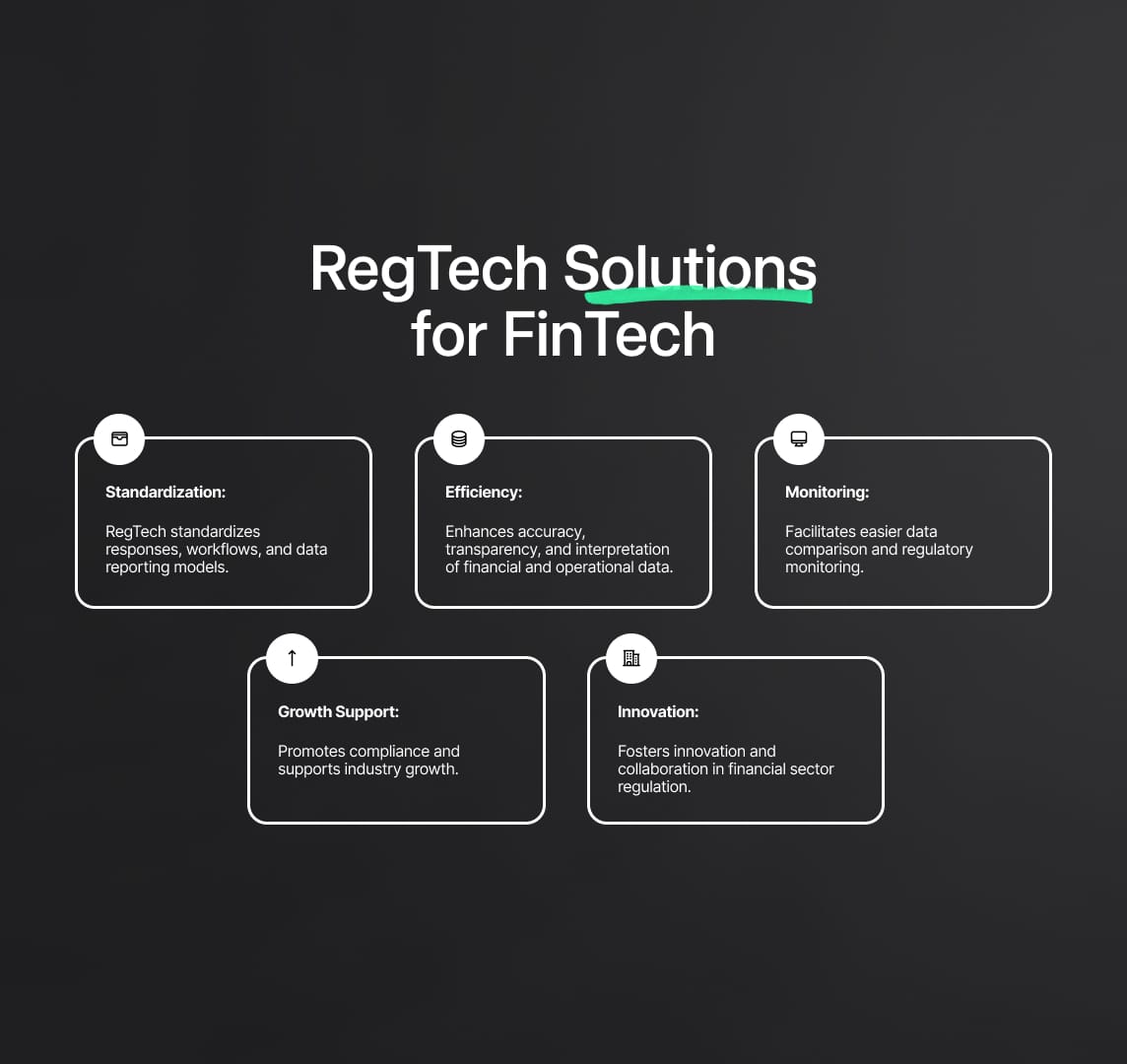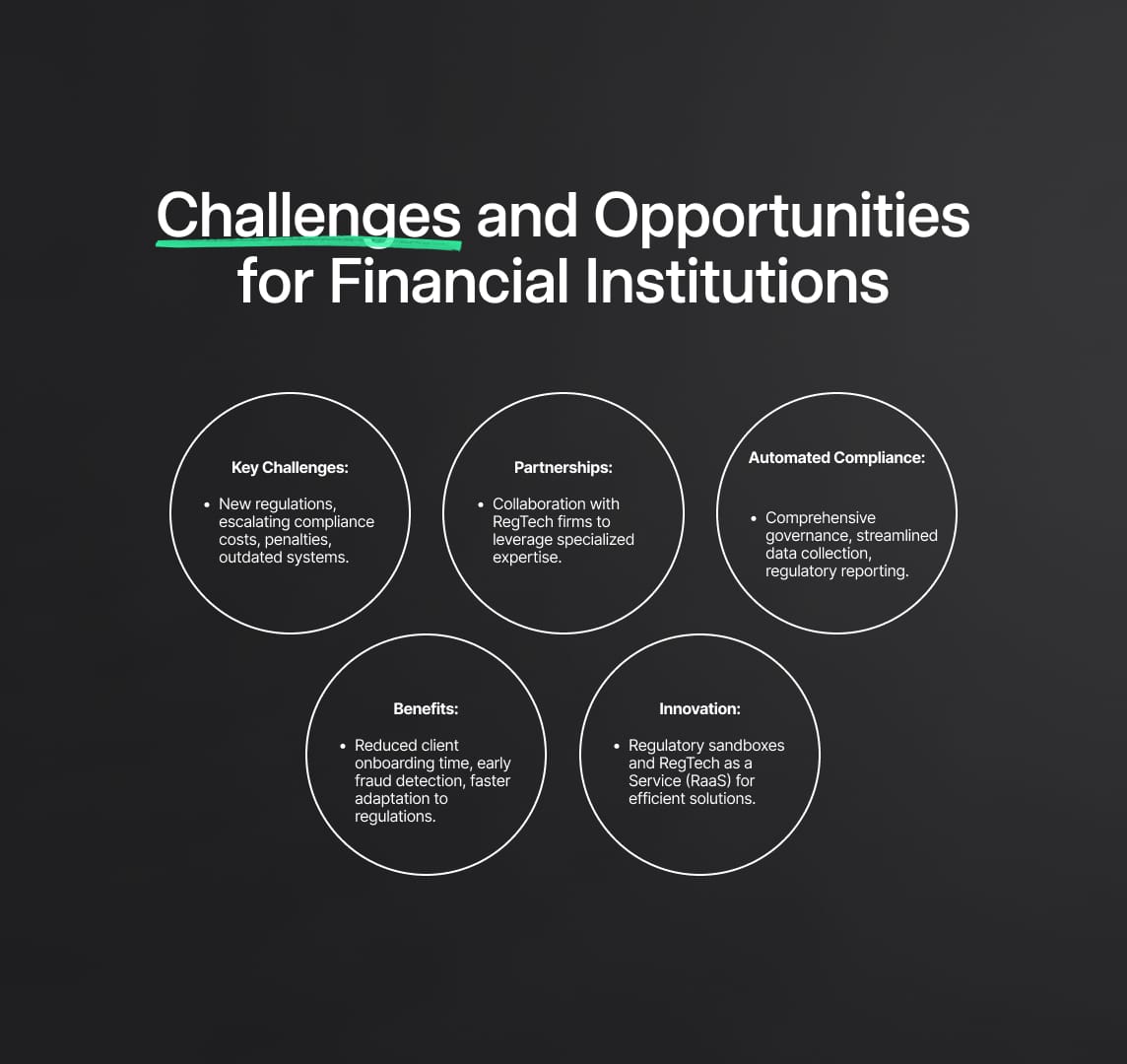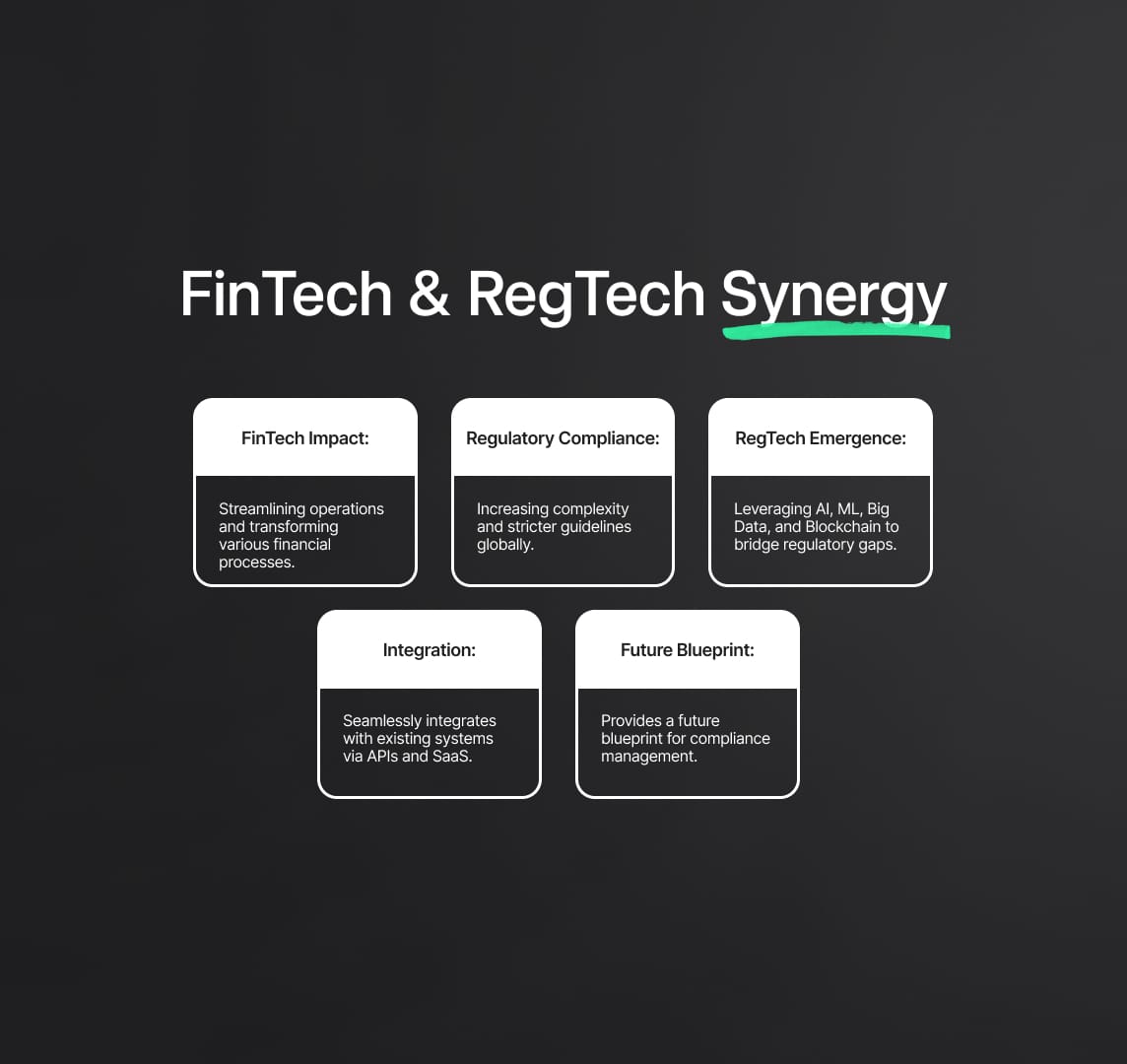How Regtech Solutions can help Fintech Industry?
RegTech streamlines compliance in finance by leveraging AI and Big Data. It aids in reducing costs, managing risks, and preparing for regulatory shifts. By fostering innovation and collaboration, it's setting new trends in financial sector regulation

Grand “Answer”:
Regtech, short for Regulatory Technology, assists the Fintech industry by standardizing responses, workflows, and data reporting models[1]. This helps Fintech companies ensure their responses to regulatory bodies are consistent, and their operations are efficient.
In terms of data reporting, Regtech standardizes how financial and operational data is reported[1]. This makes the data more accurate, transparent, and easier for regulatory authorities to interpret.[2]
These standardized processes allow for easier comparison of data across different market participants[1][2]. This helps regulators monitor market activity more effectively, and companies to spot potential regulatory issues quicker.[2]
Moreover, the use of Regtech streamlines operations and decision-making within Fintech, promoting compliance with regulations, and ultimately supporting the industry's growth.[2]

Source
[1]

FinTech and RegTech: Navigating the Dynamic Intersection
The financial sector has witnessed a wave of unprecedented changes over the past decade, largely driven by the rapid advancements in Financial Technology (FinTech). FinTech, a term coined to denote the revolutionary blend of finance and technology, has been instrumental in enhancing and automating the delivery of financial services. Its pervasive influence extends to multiple facets of the financial ecosystem, right from streamlining banking operations to simplifying lending processes, from transforming investment management to revolutionizing payment methods.
Despite these sweeping changes, there's one domain that has largely remained ensnared in complexities - regulatory compliance, a pivotal aspect that governs the functioning of financial institutions. Regulatory authorities around the globe are stepping up their efforts to impose stricter data governance and compliance guidelines, leading to the birth and exponential growth of Regulatory Technology (RegTech), a potent offshoot of FinTech. This article provides a comprehensive exploration of the intricate symbiosis between financial institutions and FinTech, underscoring the rise of RegTech and its implications, potential benefits, and likely future directions in this fast-evolving domain.
The Growing Significance of RegTech in the Modern Financial Landscape
The regulatory canvas of the financial sector has been drastically reshaped, metamorphosing into a complicated maze of rules and mandates. For financial institutions worldwide, ensuring compliance with these evolving regulations has become an increasingly daunting challenge. As they grapple with the blistering pace of financial ecosystem evolution on a global scale, the intricacy of these regulatory norms adds to the complexity. The rate and breadth of these regulatory alterations add another layer of difficulty, necessitating institutions to adhere to detailed timelines and comprehend multifaceted regulatory subtleties. This results in a complex matrix of rules and standards that vary across regions, undergo constant revisions, making compliance a daunting task to accomplish.
Within this convoluted landscape, RegTech emerges as a beacon of hope, promising to untangle this complex web of regulations and mitigate potential litigation risks. RegTech leverages the power of transformative technologies such as Artificial Intelligence (AI), Machine Learning (ML), Big Data analytics, and Blockchain to bridge regulatory gaps, minimize compliance costs, and prepare financial institutions for future regulatory challenges. Currently, there are more than 1600 firms worldwide that provide an array of RegTech services, ensuring that businesses can meet their compliance requirements in a more streamlined, efficient, and automated manner.
RegTech solutions are designed to seamlessly integrate with existing systems through Application Programming Interfaces (APIs) and Software as a Service (SaaS) models, making them particularly attractive to financial institutions. Traditional compliance systems used by banks often struggle to keep pace with the escalating regulatory demands. However, RegTech presents a pathway to fulfil these requirements without necessitating dramatic overhauls of their existing business models. It provides a blueprint for the future of compliance management, allowing financial institutions to proactively mitigate potential regulatory risks.
Challenges and Opportunities Facing Financial Institutions
Financial institutions face a plethora of obstacles as they strive to manage risk effectively. Here are the most significant challenges:
- Deciphering and implementing newly introduced financial regulations.
- Managing the escalating overhead costs associated with traditional compliance solutions.
- Navigating the potential penalties and the resultant reputational damage due to non-compliance.
- Working with outdated systems that lack the necessary levels of automation and digitization.
Establishing partnerships with RegTech firms can alleviate these challenges, enabling financial institutions to leverage specialized expertise and a flexible architectural framework to address these evolving risks. Resilient, tech-powered platforms like RegTech offer comprehensive governance and regulatory compliance, automating compliance processes, streamlining data collection, and facilitating regulatory reporting. This leads to an enhanced supervisory capacity for regulators through standardized data formatting, enabling them to effectively monitor sector developments and identify potential risks in a timely manner.
RegTech offers benefits that extend well beyond merely simplifying compliance. It fosters collaborations between institutions, regulators, and tech firms, paving the way for faster, less risky, and more cost-effective testing and scaling of innovative solutions. An excellent illustration of this collaborative approach is the creation of shared testing environments or 'sandboxes' for regulation management systems powered by machine learning.
RegTech employs cutting-edge technologies to bolster regulatory innovation, making financial services more robust, secure, and agile. It assists financial institutions by offering a wide array of services, including:
- Comprehensive compliance assessment
- In-depth risk data analysis
- Effective policy and procedure management
These interventions span a range of areas, such as simplifying compliance with complex regulations, managing vast volumes of data, enabling real-time reporting, enhancing data analytics and decision-making capabilities, reframing regulation, implementing new governance structures, and improving fraud and risk management. RegTech firms empower financial institutions to meet regulatory requirements more efficiently, building robust solutions by understanding different scenarios within the regulatory ecosystem. The result is a host of benefits, including reduced time required for client onboarding, early detection and mitigation of fraud, faster adaptation to new regulations, and improved capabilities for data collection, management, and analysis.

Trends and Directions in RegTech
Innovative RegTech solutions such as regulatory sandboxes and RegTech as a Service (RaaS) are spearheading the wave of regulatory innovation. Regulatory sandboxes provide a safe space for experimenting with potential solutions within a well-defined boundary under the guidance of regulatory and governance support, proving to be an effective tool for data governance.
RaaS encourages financial institutions to perceive RegTech not just as a compliance tool, but as a means to enhance their overall operational efficiency. The future of RegTech holds the promise of rapid expansion, powered by the ability to capture and analyze vast amounts of internal and external data using cloud storage and artificial intelligence.
By forming strategic partnerships with RegTech providers or regulatory consulting firms, financial institutions can develop comprehensive solutions that address issues related to disparate compliance teams and reduce manual labor. For instance, online identity verification solutions can tap into a wide array of reliable and independent data sources. The goal is to find efficient ways to get a technology solution understood, approved, and deployed quickly, minimizing the gap between a regulatory requirement and its compliance.
To sum it up, the symbiotic relationship between financial institutions and RegTech firms marks a significant shift in the way businesses handle regulatory compliance. As the volume and complexity of regulatory changes continue to escalate, RegTech is poised to play an even more crucial role in shaping the future of the financial sector. By offering efficient, cost-effective, and innovative solutions to the ever-evolving regulatory challenges, RegTech is playing an instrumental role in constructing a seamless bridge between financial institutions and regulatory compliance in the digital era.

Grand Answer: Your AI Partner
Designed to support compliance officers, legal counsels, and other professionals responsible for adhering to regulatory standards, Grand Answer aims to facilitate an efficient and straightforward compliance process.
Reduce your
compliance risks


